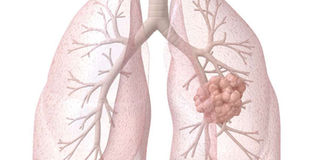Survivor reveals what it takes to beat cancer

A3D rendered illustration of a lung with carcinoma. FILE PHOTO
What you need to know:
- The requirement in India to have a caregiver admitted along with the patient also helps.
Pheris Wangeci Kariuki puts her wins in the fight against lung cancer to her faith and her conviction that she was going to come out of it.
Doctors at Medanta Hospital in India established that her cancer was at Stage Four in 2015, ending a two-year period where others in various hospitals in Nairobi interpreted the mass in her lungs seen on X-ray as pneumonia.
The last one at Nairobi Hospital found through a bronchoscopy that she had cancerous cells but could not establish the extent.
“I was able to overcome because I took a positive stand. I also have a strong Christian faith,” she said.
DIAGNOSIS
Her daughter Juliet Muthoni, who accompanied her to India, said:
“At first it came as a shock, then we realized we have to spring into action.”
“A cancer diagnosis gives you one of two choices,” she said, “Go full on and fight or resign yourself.”
As they went to India, Ms Muthoni said, they were hopeful that after all the apparent misdiagnosis her mother had in Kenya, the PET scan would establish there was nothing wrong and they would go back home.
HOPE
But mixed with that was the feeling that whatever it was, they would handle it and come back strong.
“It’s not a death sentence. It takes a lot of faith. Have faith in God. As we left, Juliet told me, ‘We are going through this thing and we’ll come back healed. We’re going to print T-shirts saying I survived cancer.’ I had the conviction that I’m going to go through this,” Ms Kariuki said.
Chemotherapy has terrible side effects – nausea, vomiting, hair loss, the reduction in immunity that makes one susceptible to disease – but the 55-year-old civil servant said the worst she suffered was an infection that had her admitted for three days.
COUNSELLING
She said this resolve was partly aided by volunteers — who are themselves cancer survivors and are therefore well informed about the treatment and its effects — who would talk to patients.
Ms Kariuki describes them as playing a big role in telling patients the things that the doctors do not have the time, or patience, to explain: what to expect as your body reacts to the drugs and what foods to avoid.
“They would tell us that on this journey, it is 60 per cent your mindset, 20 per cent the medicine and 20 per cent what you eat,” she said.
CAREGIVER
It is something she reckons would work in Kenya and give hope and encouragement to patients.
The requirement in India to have a caregiver admitted along with the patient also helps as there is a second party who can ask the doctors the necessary questions and run errands, rather than hospital staff who are also serving other patients.
While Ms Kariuki was supposed to go through six cycles of chemotherapy using a combination of two drugs, going to the hospital every three weeks, she progressed so well that after the third round, the doctors were impressed and allowed her to come back home and continue treatment here.





